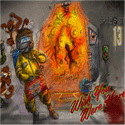- Cabbage Disrespect
- Apr 24, 2009
-

ROBUST COMBAT
Leonard Riflepiss
-
Soiled Meat
|
I don't even know what the _* operator does. When I compile:
_* (the one-eyed man operator) is mildly useful:
code:def foo(someStrings: String*) = someStrings mkString " "
foo(Seq("some", "dumb", "goon"):_*) // some dumb goon, liked you'd called foo("some", "dumb", "goon") instead
code:def foo(a: String, b: String, c: String) = s"$a $b $c"
foo(Seq("some", "dumb", "goon"):_*)
not enough arguments for method foo: (a: String, b: String, c: String)String.
Unspecified value parameters b, c.
foo(Seq("some", "dumb", "goon"):_*);}
^
|
 #
¿
Oct 31, 2015 20:19
#
¿
Oct 31, 2015 20:19
|
|
- Adbot
-
ADBOT LOVES YOU
|

|
|
#
¿
May 11, 2024 16:33
|
|
- Cabbage Disrespect
- Apr 24, 2009
-

ROBUST COMBAT
Leonard Riflepiss
-
Soiled Meat
|
Best I came up with is, pseudocodish:
code:Iterator[Tuple2[String, String]]
.toList // Iterator has no group by
.groupBy(t => t._1) // Now we have a Map[String, List[Tuple2[String, String]]]
.mapValues(tupleList => tupleList.map(t => t._2)) // Now we have a Map[String, List[String]]
.mapValues(stringList => new TreeSet[String] ++ stringList) // Create a new TreeSet and add everything from the list to it
code:val a = List(Tuple2("a", "1"), Tuple2("a", "2"), Tuple2("b", "1"), Tuple2("b", "2"), Tuple2("b", "3"))
val b = a.groupBy(t => t._1).mapValues(v => v.map(v => v._2)).mapValues(v => TreeSet[String] ++ v)
So im guessing I'm missing something obvious here and I'm creating way too many objects/maps/lists or something.
You can:
code:val brennansMap = foldLeft(Map[String, TreeSet[String]]().withDefaultValue(TreeSet.empty)) { build yo map up by matching in here }
For the general pattern of "gee I have to transform my collection into these intermediate collections and I wish that I didn't", check out collection.breakOut (but as you're doing that to get groupBy here, it's not really helpful, just good to know). When you're doing really performance-critical stuff, sometimes the easiest option is to bite the bullet, do the disgusting mutable thing, then wrap it in immutable functional ivory towers so that nobody else has to see what you've done.
|
 #
¿
Jun 16, 2016 01:24
#
¿
Jun 16, 2016 01:24
|
|




